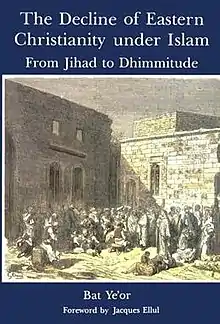The Decline of Eastern Christianity
The Decline of Eastern Christianity under Islam: From Jihad to Dhimmitude[1] is a book by author Bat Ye'or. In the book the author describes her interpretation of the waning of the Eastern Christendom under the Islamic empire's conquests.
 | |
| Author | Bat Ye'or |
|---|---|
| Country | United States |
| Language | English |
| Subject | Islamic empire's conquests. |
| Genre | Islamic history |
| Publisher | Fairleigh Dickinson Univ Pr |
Publication date | September 1, 1996 |
| Media type | Print (Hardcover, Paperback), E-book |
| Pages | 522 |
| ISBN | 978-0838636787 |
| OCLC | 876802597 |
Thesis and structure
Bat Yeor described her book as "In this study, I tried to analyze the numerous processes that had transformed rich, powerful Christian civilizations into Islamic lands and their long-term effects, which had reduced native Christian majorities into scattered small religious minorities, now slowly disappearing. This complex Islamization process of Christian lands and civilizations on both shores of the Mediterranean—and in Iraq and Armenia—I have called: the process of "dhimmitude" and the civilization of those peoples who underwent such transformation, I have named the civilization of "dhimmitude".
The book consists of two parts, an analysis, which aims to paint a broad picture of the conversion of the Near East to Islam, and an appendix containing selected primary sources. The emphasis of the analysis lies on the near past, especially the 19th century. The appendix contains translations of Islamic and non-Islamic sources from the Middle Ages and Western sources of newer date.[2]
Reviews
Academic
Professor of Middle East studies at The Hebrew University of Jerusalem, Mordechai Nisan writes that Bat Ye'or's "exceptionally relevant scholarly study ... amasses compelling evidence and employs powerful argumentation to expose and explain dhimmitude—the author's neologism." She challenges traditional notions of Islamic tolerance and the future of minorities within Islamic lands.[3]
German orientalist Holger Preissler, in a review positive to the ambition and subject of the book, writes that the book curiously does not cite readily available high quality sources, and that Ye'Or overplays the role of jihad in modern times. He also points out that in criticising frequent one-sided and apologetic uses of Islamic sources, Ye'Or fails to avoid going to the opposite extreme, particularly in the documentation part of the book.[2]
Sidney H. Griffith writes that Bat Yeor raised important inter-religious problem but the book itself is problematic as Griffith points out : "They [the documents used as sources] are presented out of context with no analysis or explanation... The trouble with The Decline of Eastern Christianity is that in spite of the gathering of an enormous amount of historical material, and although she has raised an issue that well deserves study, Bat Ye'or has written a polemical tract, not responsible historical analysis.Meanwhile, the historical question remains to be answered: why is it that from the mid-7th century to the 20th century the number of Christians in the Islamic world has dwindled from a majority in many areas of the Middle East to virtual insignificance in terms of demography? Is it really due to the net effects of the disabilities prescribed by Islamic law for the dhimmil Or are there other factors?"[4]
In a review of The Decline of Eastern Christianity Under Islam: From Jihad to Dhimmitude the American historian Robert Brenton Betts commented that the book dealt with Judaism at least as much as with Christianity, that the title was misleading and the central premise flawed. He said: "The general tone of the book is strident and anti-Muslim. This is coupled with selective scholarship designed to pick out the worst examples of anti-Christian behavior by Muslim governments, usually in time of war and threats to their own destruction (as in the case of the Turk-perpetrated Armenian genocide of 1915). Add to this the attempt to demonize the so-called Islamic threat to Western civilization and the end-product is generally unedifying and frequently irritating."[5]
Other
The Catholic convert and minister Richard John Neuhaus wrote that the book "tells the story straight, thus countering the Islamophile histories that have dominated Western thought for so long".[6]
See also
References
- Bat Ye'or (1996). The decline of Eastern Christianity under Islam: from Jihad to Dhimmitude: seventh-twentieth century. Madison, NJ: Fairleigh Dickinson University Press. ISBN 0-8386-3678-0.
- Holger Preissler (2001). "Bat Ye'Or: The Decline of Eastern Christianity under Islam: From Jihad to Dhimmitude. Seventh-Twentieth Century". Der Islam. 78 (2). doi:10.1515/islm.2001.78.2.328.
- Mordechai Nisan (Fall 2002). "Islam and Dhimmitude: Where Civilizations Collide". The Middle East Quarterly. IX (4).
- Griffith, Sidney H., The Decline of Eastern Christianity under Islam: From Jihad to Dhimmitude, Seventh-Twentieth Century, International Journal of Middle East Studies, Vol. 30, No. 4. (Nov., 1998), pp. 619-621, doi:10.1017/S0020743800052831.
- Robert Brenton Betts, "The Decline of Eastern Christianity Under Islam: From Jihad to Dhimmitude".Middle East Policy 5 (3) (September 1997), pp. 200-203
- Richard John Neuhaus First Things (October 1997). The Approaching Century of Religion " it tells the story straight, thus countering the Islamophile histories that have dominated Western thought for so long. About half the book is given to a telling of the story, and the second half to a fascinating collection of documentary evidence from the beginning of Islam to the present ..Bat Ye'or persuasively demonstrates, is a radical distortion of what happened. Islam's spectacular spread was brought about by brutal military conquest, rapine, spoliation, and slavery, joined to a regime of "dhimmitude" that was based on deep contempt for the subject infidels, including the Peoples of the Book. "